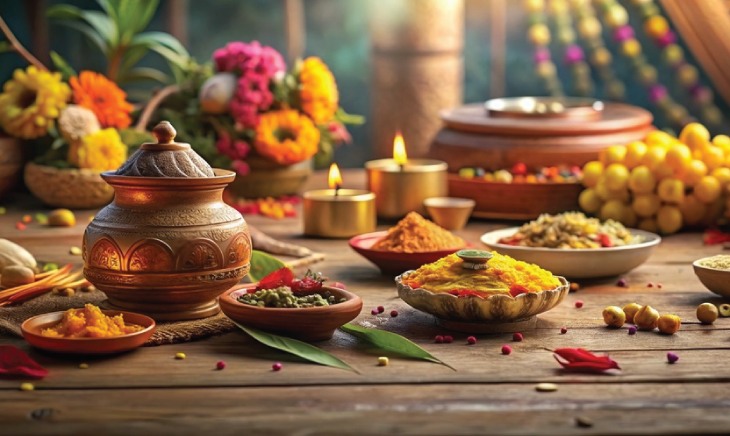Telugu Traditions Meet Modern Living: Balancing Culture in Apartment Communities

In today’s fast-paced urban life, many Telugu families find themselves torn between preserving their rich traditions and adapting to modern lifestyles. The warmth of joint families, the sound of festive celebrations, and the aroma of home-cooked delicacies—these are not just memories; they define our roots. But does moving into an apartment community mean letting go of these cherished customs?
Absolutely not. Communities like A2A Homeland are building spaces where Telugu traditions and contemporary lifestyles harmoniously coexist. In this blog, we explore how cultural heritage is thriving in apartment living and how you can make your new home feel just like your homeland.
The Essence of Telugu Culture in a Modern Setting
Telugu culture is deeply rooted in traditions, from elaborate wedding rituals to grand festive celebrations. Every custom reflects the values of unity, respect, and warmth. But in today’s world of nuclear families and apartment living, can these traditions be sustained? The answer lies in adapting, not abandoning.
A2A Homeland : Bringing Traditions to Gated Communities
The design of A2A Homeland embodies the essence of a genuine homeland. Whether it’s through dedicated spaces like 2 massive clubhouses for cultural activities or the way festivals are celebrated within the community, the project ensures that residents don’t feel detached from their cultural roots.
Telugu Festivals: Celebrating Together in Apartment Communities
For every Telugu family, festivals are not just about rituals but about togetherness. Sankranti, Ugadi, Holi, Vinayaka Chavithi, and Diwali bring families together to share meals, exchange gifts, and perform age-old traditions.
Apartment Communities as Festive Hubs
Many modern apartments, like A2A Homeland, have adapted to this by organising celebrations within the community. Residents gather in open spaces or clubhouses to decorate, cook traditional foods, and conduct cultural performances. This fosters a strong sense of belonging while ensuring that traditions remain alive.
The Role of Language and Arts in Keeping Culture Alive
One of the biggest concerns for Telugu families in modern urban setups is ensuring that the younger generation stays connected to their mother tongue. Apartment communities can play a pivotal role by encouraging storytelling sessions, language workshops, and cultural clubs.
Performing Arts and Cultural Shows
Telugu cinema, classical dance forms like Kuchipudi, and Carnatic music have always been an integral part of our cultural identity. Gated communities like A2A Homeland provide spaces where residents can organise dance and music classes, keeping these traditional art forms alive.
The Importance of Food: Traditional Telugu Cuisine in Modern Homes
The taste of a home-cooked meal prepared by our grandmothers is irreplaceable. Dishes like pulihora, pappu charu, and bobbatlu are not just food; they are stories passed down through generations.
Community Cooking and Potluck Gatherings
A2A Homeland promotes community dining experiences where residents can share their homemade dishes with neighbours, just like in traditional villages. This encourages people to stay connected to their roots while building stronger relationships within the community.
Family Bonds in Apartment Living: Modern Homes, Traditional Values
Earlier, joint families thrived under a single roof, where elders shared their wisdom, and children grew up with strong family values. While urbanisation has led to nuclear families, apartment living is recreating the essence of a joint family by fostering close-knit communities.
A2A Homeland: A Home That Feels Like Your Homeland
A2A Homeland has been designed with the concept of extended families in mind. With common recreational areas, parks, and cultural spaces, clubhouses ensure that neighbours become extended family, creating a supportive and culturally rich environment.
Spirituality and Worship Spaces in Gated Communities
Temples and pooja rooms have always been central to Telugu households. Many modern apartments now have dedicated spaces for community prayers, ensuring that spiritual practices remain intact. Communities like A2A Homeland organise devotional gatherings, where residents can come together for religious activities, keeping religious traditions alive in a modern setting.
Raising Culturally Rooted Children in an Urban World
Children growing up in urban settings often miss out on the cultural experiences their parents had. Schools may not focus on local traditions, making it the responsibility of the community to bridge the gap.Gated communities organise interactive sessions where elders can share stories from Telugu folklore, mythology, and history, helping young minds appreciate their rich heritage.
A Harmonious Blend: The Future of Telugu Traditions in Urban Spaces
Modern apartment communities like A2A Homeland are proving that tradition and contemporary lifestyles can coexist beautifully. By providing spaces for festivals, arts, spirituality, and communal bonding, these communities ensure that Telugu culture is not just preserved but thrives in the modern world.For Telugu families looking for a home that feels like their homeland,A2A Homeland is more than just a place to live—it’s a place that rekindles memories of their homeland.
Conclusion
Telugu traditions are not just a part of history; they are a living, breathing aspect of our everyday lives. While urbanisation may have changed our lifestyles, our core values remain the same. Communities like A2A Homeland are redefining modern living by ensuring that the warmth of tradition continues to thrive within apartment complexes.
If you’re looking for a home where culture meets convenience, where celebrations bring people together, and where tradition feels alive—then A2A Homeland is the perfect place to call home.
